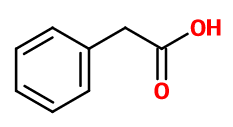
Photo credits: ScenTree SAS
Do you sell any of the raw materials? Would you like to let our users know?
Send an email to fournisseurs@scentree.coto learn about our advertising opportunities.
Do you sell any of the raw materials? Would you like to let our users know?
Send an email to fournisseurs@scentree.coto learn about our advertising opportunities.
General Presentation
-
CAS N° : 103-82-2
-
EINECS number : 203-148-6
-
FEMA number : 2878
-
FLAVIS number : 08.038
-
JECFA number : 1007
-
Appearance : White crystals
-
Density : 1,08
-
Volatility : Heart
-
Price Range : €
Physico-chemical properties
-
Molecular formula : C8H8O2
-
Molecular Weight : 136,14 g/mol
-
Log P : 1,4
-
Fusion Point : 77°C
-
Boiling Point : 265°C
-
Detection Threshold : 1 ppm (0,0001%)
Ce qui fait de lui un composé moins facilement détectable que l'Alcool phényléthylique
-
Optical rotation : Donnée indisponible
-
Vapor pressure : Donnée indisponible
-
Refractive Index @20°C : Donnée indisponible
-
Acid Value : Donnée indisponible.
-
Flash Point : 132°C
Uses
Uses in perfumery :
Phenylacetic Acid gives a honeyed and sweet touch to a rose note.
Year of discovery :
1885
Natural availability :
Phenylacetic Acid is present in Tobacco Absolute, Cocoa Absolute and chicory from which it can be extracted in small quantities. Synthetic Phenylacetic Acid remains the most produced and used in perfumery.
Isomerism :
Anisic Aldehyde and Methyl Benzoate are constitutional isomers of Phenylacetic Acid. However, their smell is not related.
Synthesis precursor :
Phenylacetic acid is the precursor for the synthesis of several esters called ''phenyl acetates '', by reacting it with an alcohol in the presence of a catalyst acid.
Synthesis route :
Phenylacetic Acid is obtained according to a synthetic route in two steps, that involves benzyl chloride with sodium cyanide, followed by a hydrolysis to obtain the corresponding acid.
Regulations & IFRA
Allergens :
This ingredient does not contain any allergen.
IFRA 51th :
This ingredient is not restricted for the 51th amendment

